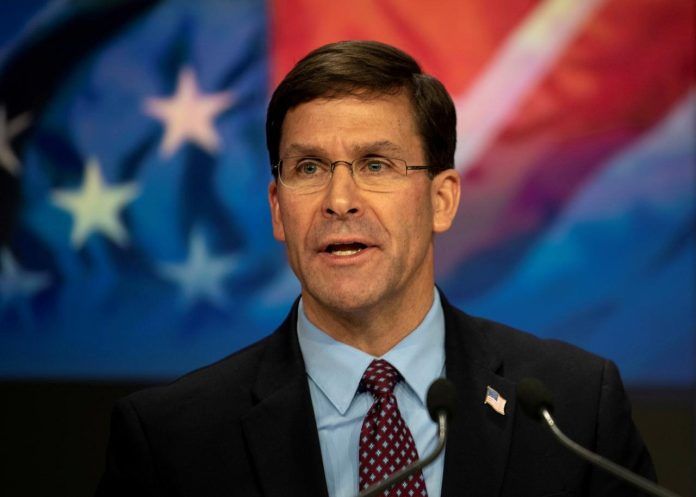By Phil Stewart
WASHINGTON, Jan 7 (Reuters) – The United States should expect Iran to retaliate over the U.S. killing of Iranian military commander Qassem Soleimani, Defense Secretary Mark Esper said on Tuesday, as a top Tehran general vowed a “hard and definitive revenge.”
Esper declined to detail any intelligence driving that assessment or comment on Iranian military activities that could signal Tehran’s intentions. Reuters has reported that Iranian missile forces have been put on a heightened state of alert.
“I think we should expect that they will retaliate in some way, shape or form,” Esper told a news briefing at the Pentagon, adding that such retaliation could be through Iran-backed proxy groups or “by their own hand.”
“We’re prepared for any contingency. And then we will respond appropriately to whatever they do.”
U.S. officials have said the killing of Soleimani while he was on a trip to Iraq on Friday was based on intelligence indicating forces under his command planned further attacks on U.S. targets in the region, though they have provided no evidence.
Esper spoke hours after the head of Iran‘s Revolutionary Guards, General Hossein Salami, told mourners gathered for Soleimani’s funeral in the southeastern city of Kerman: “We will take revenge, a hard and definitive revenge.”
[aesop_image img=”https://kayhanlife.com/wp-content/uploads/2019/07/salami-54309.jpg” panorama=”off” credit=”FILE PHOTO: Hossein Salami. Source http://www.rajanews.com/news/227073 Author: Mohammad Reza Jofar. Permission (Reusing this file) Content on rajanews.com is licensed under a Creative Commons Attribution 4.0 International license” align=”center” lightbox=”off” captionsrc=”custom” captionposition=”left” revealfx=”off” overlay_revealfx=”off”]
Iran, whose coastline runs along a Persian Gulf oil shipping route that includes the narrow Strait of Hormuz, has allied forces across the Middle East through which it can act. Representatives from those groups, including the Palestinian Islamist Hamas and Lebanon’s Hezbollah movement, attended funeral events in Tehran.
As tensions rise, the Pentagon has been moving thousands of additional forces into the Middle East, including a small number of soldiers from the 173rd Airborne Brigade. It is also sending the roughly 3,500 soldiers from the Immediate Response Force (IRF) brigade of the 82nd Airborne Division.
Esper said the moves were aimed at force protection and said he would do more as necessary “to protect our people, our interests and our facilities.”
Esper cautioned that although the United States did not seek a war with Iran, “we are prepared to finish one.”
But with both sides trading threats and counter-threats, it was unclear how tensions might be reduced.
Asked if there was any off-ramp to avoid conflict, Esper suggested Iran would need to act by choosing diplomacy, without preconditions.
“There is a big off ramp sitting in front of Tehran right now, and that is to de-escalate, to message us that they want to sit down and talk – without precondition, by the way – to the United States about a better way forward,” he said.
Tensions between Washington and Tehran have risen steadily since May 2018 when U.S. President Donald Trump withdrew from a 2015 international accord that put limits on Iran‘s nuclear program in exchange for some relief from sanctions. Trump said the accord reached under the previous Obama administration did not go far enough and did not curb Iran‘s activities in the Middle East.
Even if there is no further military action, the U.S. drone strike that killed the general appears to have offered Tehran an opportunity to try to unify the country just two months after anti-government protests.
It has also amplified calls from U.S. opponents inside Iraq for U.S. forces to leave. Esper has repeatedly played down an Iraqi parliamentary vote calling for U.S. troops to withdraw, saying it was non-binding and that some lawmakers voted “at the point of a gun.”
Esper said he had not received a request from Iraq to withdraw the more than 5,000 U.S. troops there.
(Reporting by Phil Stewart; Editing by Mary Milliken and Grant McCool)


